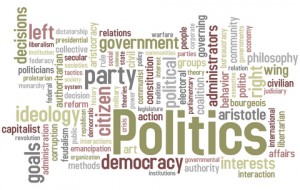Can meditation on compassion change the way that we view politics?
Regardless of our political inclinations or leanings, we are all subject to the political fracas that erupts years before Presidential elections, and that is almost ongoing in the general and special elections within the local political arena.
Do you ever get the impression that many of these politicians, regardless of their party, don’t have any idea of how badly we all want things to change for the benefit of everyone? For instance, I don’t think that any of us want Medicare to disappear, leaving the elderly in dire straits. Nor do we want those in need to simply be abandoned and forgotten. Could any of us say that we want to see more people unemployed, or suffering?
Think of this for a moment: all of us, regardless of our nationality, religion, race, gender, want to be happy and want to be free from suffering. “Meditate” on this, let it sink in. None of us wishes to be unhappy, and we all want to be happy…even if we’re willing to make others suffer for our happiness! Let’s keep this in mind as we read this post.
What’s missing in the political landscape? Compassion. Many people believe that the Democrats represent the compassionate approach, focusing on providing financial and social welfare for those in need. Whereas, others believe that the compassionate conservatism of the Republican party, aimed at others to help themselves and to become less dependent upon a huge centralized government, is the way to go.
One definition of compassion that I like comes from a book called, The Tibetan Book of Living and Dying, written by Sogyal Rinpoche. He writes:
What is compassion? It is not simply a sense of sympathy or caring for the person suffering, not simply a warmth of heart toward the person before you, or a sharp clarity of recognition of their needs and pain; it is also a sustained and practical determination to do whatever is possible and necessary to help alleviate their suffering.[i]
I like that in this definition, it includes a “practical determination to do whatever is possible…” For me, and for others who practice within a meditative or contemplative tradition, this act of doing anything possible includes working with our mind and meditating on compassion for the benefit of others.
All spiritual traditions have definitions of compassion. Even science has jumped into studying how compassionate meditation affects the brain and how practicing compassion can alter the connections (synapses) within the brain.
How this relates to politics and politicians is that when we hear a politician say something, or find out that they’ve done something that really goes against the grain of what we believe, let’s remember that they’re doing what they believe is the right thing to do. Whether that “right thing” is something based on a selfish motivation, or an altruistic one, it comes from the same place: this person wants to be happy and wishes to be free from suffering.
So, how do we meditate on compassion when we’re completely fed up with politics as usual, or when our preferred party doesn’t seem to be getting it right (or maybe our least preferred party seems to be getting it “wrong!”) Try these four steps:
- The notion that everyone wants to be happy and free from suffering is the basis upon which we generate a compassionate meditation or a compassionate mind towards others. While we may observe another and view their actions or words as harmful or against what we “know” to be the truth, we can acknowledge that they’re doing their best to be free from internal conflict and to create happiness for themselves. Then we can begin to have some compassion for them as human beings.
- Creating happiness, based on outward circumstances, is what most of us do. We try to manipulate our outer circumstances so that we can have happiness. What this constant focus on the outer circumstances brings us is less than true happiness, because true happiness resides within ourselves, not “out there” in our bank accounts, homes, businesses, spouses…whatever. True happiness is based on our being able to rest our mind in what is, and to be at peace with what we have.
- Politicians are trying to help others. Now, at least for me, I know that this one is a stretch. Rarely do I perceive that those in politics are truly altruistic, without their own motives and agenda. Yet, isn’t the same true for me? By voting a particular way, don’t I somehow believe that a particular politician has my best interest in mind? Well, I may say, “yes, but my best interest is to see the poor taken care of,” or, “my best interest is to see that government doesn’t infringe on the rights of those who pay taxes,” etc… Still, how is that still my own view? If it irks me that there are those who are hungry in this country, or that big government has too much control over my life, aren’t these views fueled by a desire not to feel bad within myself? That’s a lot to think about, but reflect on it.
- Everyone deserves compassion. There isn’t one person, libertarian or republican, tea-party or democrat, who isn’t deserving of compassion. As a registered nurse, I’ve taken care of the wealthy and the downtrodden, the caring and the careless, the well off and the homeless, the democrat and the republican. And in all that time, there’s never been a single person whom I didn’t wish to help to feel better and to be free of physical or mental suffering. It’s just that simple.
The ideas presented in this post may not appeal to everyone, nor may they seem easy to digest. Even for me (and I’m writing this stuff), I find myself struggling with how to find compassion for those whose actions or words go against my basic sense of what is “right.” Yet, when I dig down, when I ask myself who these people are, I find myself realizing that we’re all human, we’re all doing our best to get along in the world, and trying to do what is “right.”
Maybe if we focused on our commonness more than our differences, we’d find ways to take the politics out of government, and simply be able to do what benefits all of humankind. Dreaming? Perhaps. Far-fetched? Maybe. But the alternative is to continue to go on, fighting for our “small self” without realizing that by doing so, we’re fighting against the greater good that is humankind.
So, should I keep politics out of these discussions? Are there things that I forgot to say? Is there another way to bring compassion into politics? What do you think? Let me and others know what you find think. And, as always, please feel free to contact me if you’d like to see additional content or other discussions on this site.For more information on how to meditate, exercises in working with the breath, and other nifty stuff, please see the Related Posts below.
Also, don’t forget to download the free ebook, Can Meditation Change the Way that You View Your World?, for help with getting started in you meditation practice. Also, you can now download the new ebook, How to Work with the Four Distractions to Meditation.
NEW – check out the media drop-down menu in the navigation bar at the top of this page, where you can links to articles, MP3 tracks for downloading, and videos on the subject of meditation.
[i] Rinpoche, Sogyal. The Tibetan Book of Living and Dying. San Francisco: Harper, 1992, pg. 187.




This article truly speaks to a higher mind and requires one to practice equanimity, which is no easy task. i applaud you jerome for taking on this topic and offering some very compelling ways to practice!
This article truly speaks to a higher mind and requires one to practice equanimity, which is no easy task. i applaud you jerome for taking on this topic and offering some very compelling ways to practice!